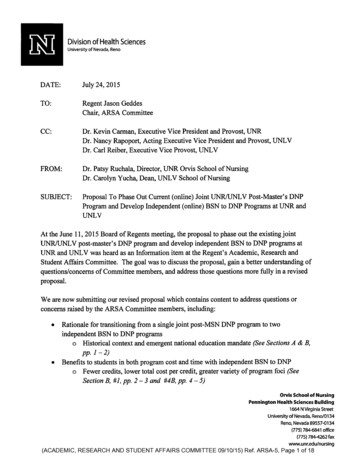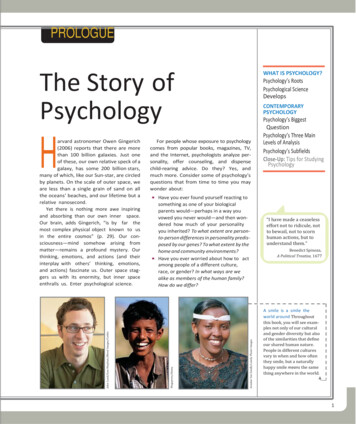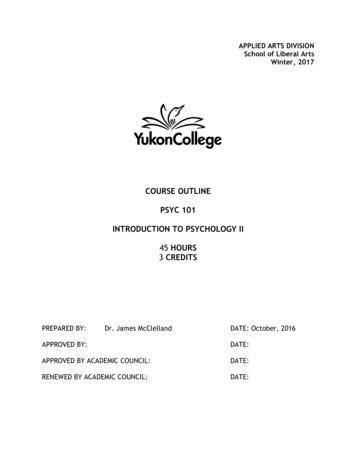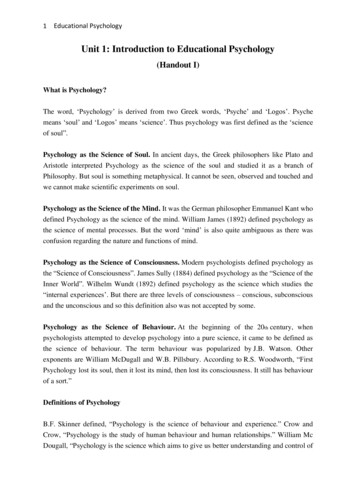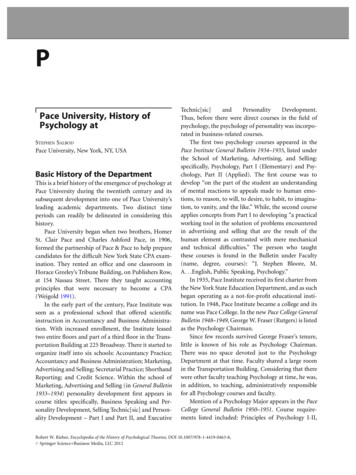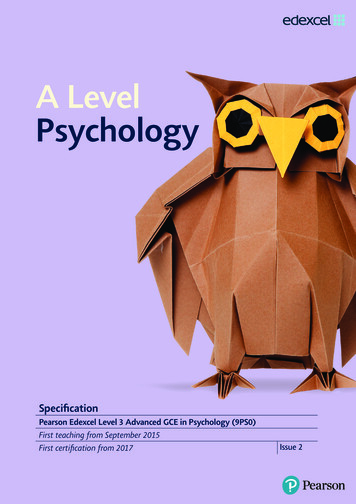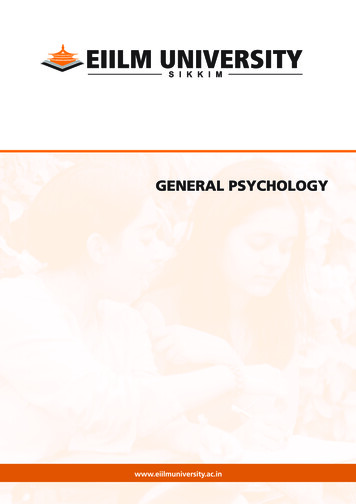
Transcription
Subject: GENERAL PSYCHOLOGYCredits: 4SYLLABUSA definition of PsychologyPractical problems, Methods of Psychology, Work of Psychologists, Schools of psychology, Attention &Perception - Conscious clarity, determinants of Attention, Distraction, Sensory deprivation, Perceptualconstancies, perception of fundamental physical dimensions, Illusions, Organizational factors of perception.Principles of learningClassical conditioning, Operant Conditioning, Principles of reinforcement, Cognitive Learning, Individualizedlearning, Learner & learning memory - kinds of memory, processes of memory, stages of memory, forgetting.Thinking and language - Thinking process, Concepts.Intelligence & MotivationTheories - Measurement of Intelligence; Determinants; Testing for special aptitudes, Motivation - Motives asinferences, Explanations and predictors, Biological motivation, Social motives, Motives to know and to beeffective.EmotionsPhysiology of emotion, Expression of emotions, Theories of emotions; Frustration and conflict, Personality Determinants of Personality, Theories of personality Psychodynamic, Trait, Type, Learning, Behavioural &Self: Measurement of personalitySuggested Readings:1. Morgan, Clifford. T., King, Richard. A., Weisz, John.R., Schopler, John, Introduction to Psychology,TataMcGraw Hill.2. Marx, Melvin H. Introduction to psychology - Problems, Procedures & Principles, MacMillan PublishingCo.3. Rathus, Spencer A. Essentials of Psychology.4. Kalat, James W. Introduction to psychology, 4th edition, Brooks / Cole Publishing Co.
A DEFINITION OF PSYCHOLOGYSTRUCTURELearning objectivesPsychologyHistorySubfieldsMethods of psychologyCriticismWork of psychologistsSchools of psychologyAttention and perception—conscious clarityDeterminants of attentionDistraction sensory deprivationPerceptual developmentCharacteristics of perceptual developmentsTheories of perceptual developmentPerceptual constanciesPerception of fundamental physical dimensionsOrganizational factors of perceptionReview questionsLEARNING OBJECTIVESUnderstand the meaning of psychology;Explain the subfields of Psychology;Explain the methods of psychology;Understand the attention and perception;Understand the perceptual development;Understand the theories of perceptual development; andUnderstand the organizational factors of perception.PSYCHOLOGYPsychology is an academic and applied discipline that involves thescientific study of mental functions and behaviors. Psychology has theimmediate goal of understanding individuals and groups through both
establishing general principles and researching specific cases, and throughseveral accounts it ultimately aims to benefit society. In this field, aprofessional practitioner or researcher is described a psychologist and can beclassified as a social, behavioral, or cognitive scientist.Psychologists explore concepts such as perception, cognition, attention,emotion, phenomenology, motivation, brain functioning, personality,behavior, and interpersonal relationships. Psychologists of diverse stripes alsoconsider the unconscious mind. Psychologists employ empirical methods toinfer causal and correlational relationships flanked by psychosocial variables.In addition, or in opposition, to employing empirical and deductive methods,some—especially clinical and counseling psychologists—at times rely uponsymbolic interpretation and other inductive techniques. Psychology has beendescribed as a "hub science", with psychological findings linking to researchand perspectives from the social sciences, natural sciences, medicine, and thehumanities, such as philosophy.While psychological knowledge is often applied to the assessment andtreatment of mental health problems, it is also directed towards understandingand solving problems in several different spheres of human activity. Themajority of psychologists are involved in some kind of therapeutic role,practicing in clinical, counseling, or school settings. Several do scientificresearch on a wide range of topics related to mental processes and behavior,and typically work in university psychology departments or teach in otheracademic settings (e.g., medical schools, hospitals). Some are employed inindustrial and organizational settings, or in other areas such as humandevelopment and aging, sports, health, and the media, as well as in forensicinvestigation and other characteristics of law.HISTORYThe study of psychology in a philosophical context dates back to theancient civilizations of Egypt, Greece, China, India, and Persia. As early as the4th century BC, Greek physician Hippocrates theorized that mental disorderswere of a physical, rather than divine, nature.StructuralismGerman physician Wilhelm Wundt is credited with introducingpsychological detection into a laboratory setting. Recognized as the "father ofexperimental psychology", he founded the first psychological laboratory, atLeipzig University, in 1879. Wundt focused on breaking down mentalprocesses into the most basic components, motivated in part through ananalogy to recent advances in chemistry, and its successful investigation of theelements and structure of material. Although Wundt, himself, was not astructuralist, his student Edward Titchener, a major figure in early American
psychology, was a structuralist thinker opposed to functionalist approaches.FunctionalismFunctionalism formed as a reaction to the theories of the structuralistschool of thought and was heavily influenced through the work of theAmerican philosopher, scientist, and psychologist William James. James feltthat psychology should have practical value, and that psychologists shouldfind out how the mind can function to a person's benefit. In his book,Principles of Psychology, published in 1890, he laid the foundations forseveral of the questions that psychologists would explore for years to come.Other major functionalist thinkers incorporated John Dewey and Harvey Carr.Other 19th-century contributors to the field contain the Germanpsychologist Hermann Ebbinghaus, a pioneer in the experimental study ofmemory, who urbanized quantitative models of learning and forgetting at theUniversity of Berlin, and the Russian-Soviet physiologist Ivan Pavlov, whoexposed in dogs a learning process that was later termed "classicalconditioning" and applied to human beings.Starting in the 1950s, the experimental techniques urbanized throughWundt, James, Ebbinghaus, and others re-appeared as experimentalpsychology became increasingly cognitivist—concerned with information andits processing—and, eventually, constituted a part of the wider cognitivescience. In its early years, this development was seen as a "revolution," ascognitive science both responded to and reacted against then-popular theories,including psychoanalytic and behaviorist theories.PsychoanalysisFrom the 1890s until his death in 1939, the Austrian physician SigmundFreud urbanized psychoanalysis, which comprised a method of investigatingthe mind and interpreting experience; a systematized set of theories in relationto the human behavior; and a form of psychotherapy to treat psychological oremotional distress, especially unconscious conflict. Freud's psychoanalytictheory was largely based on interpretive methods, introspection, and clinicalobservations. It became very well recognized, largely because it tackledsubjects such as sexuality, repression, and the unconscious mind as generalcharacteristics of psychological development. These were largely measuredtaboo subjects at the time, and Freud provided a catalyst for them to be openlydiscussed in polite society. Clinically, Freud helped to pioneer the method offree association and a therapeutic interest in dream interpretation. Freud hadan important influence on Swiss psychiatrist Carl Jung, whose analyticalpsychology became an alternative form of depth psychology. Other wellrecognized psychoanalytic scholars of the mid-20th century incorporatedpsychoanalysts, psychologists, psychiatrists, and philosophers. Among these
thinkers were Erik Erikson, Melanie Klein, D.W. Winnicott, Karen Horney,Erich Fromm, John Bowlby, and Sigmund Freud's daughter, Anna Freud.Throughout the 20th century, psychoanalysis evolved into diverse schools ofthought, most of which may be classed as Neo-Freudian.Psychoanalytic theory and therapy were criticized through psychologistssuch as Hans Eysenck, and through philosophers including Karl Popper.Popper, a philosopher of science, argued that psychoanalysis had beenmisrepresented as a scientific discipline, whereas Eysenck said thatpsychoanalytic tenets had been contradicted through experimental data.Meanwhile, though, researchers in the emerging field of neuro-psychoanalysisdefended some of Freud's ideas on scientific grounds, while scholars of thehumanities maintained that Freud was not a "scientist at all, but . aninterpreter."BehaviorismIn the United States, behaviorism became the dominant school of thoughtthroughout the 1950s. Behaviorism is a discipline that was established in theearly 20th century through John B. Watson, and embraced and extendedthrough Edward Thorndike, Clark L. Hull, Edward C. Tolman, and later B.F.Skinner. Theories of learning accentuated the methods in which people mightbe predisposed, or conditioned, through their environments to behave incertain methods.Classical conditioning was an early behaviorist model. It posited thatbehavioral tendencies are determined through immediate associations flankedby several environmental stimuli and the degree of pleasure or pain thatfollows. Behavioral patterns, then, were understood to consist of organisms'conditioned responses to the stimuli in their environment. The stimuli wereheld to exert influence in proportion to their prior repetition or to the previousintensity of their associated pain or pleasure. Much research consisted oflaboratory-based animal experimentation, which was increasing in popularityas physiology grew more sophisticated.Skinner's behaviorism shared with its precursors a philosophicalinclination toward positivism and determinism. He whispered that the contentsof the mind were not open to scientific scrutiny and that scientific psychologyshould emphasize the study of observable behavior. He focused on behavior–environment relations and analyzed overt and covert (i.e., private) behavior asa function of the organism interacting with its environment. Behavioristsusually rejected or deemphasized dualistic explanations such as "mind" or"consciousness"; and, in lieu of probing an "unconscious mind" that underliesunawareness, they spoke of the "contingency-shaped behaviors" in whichunawareness becomes outwardly manifest.Notable incidents in the history of behaviorism are John B. Watson's LittleAlbert experiment which applied classical conditioning to the developing
human child, and the clarification of the difference flanked by classicalconditioning and operant (or instrumental) conditioning, first through Millerand Kanorski and then through Skinner. Skinner's version of behaviorismaccentuated operant conditioning, through which behaviors are strengthenedor weakened through their consequences.Linguist Noam Chomsky's critique of the behaviorist model of languageacquisition is widely regarded as a key factor in the decline of behaviorism'sprominence. Martin Seligman and colleagues exposed that the conditioning ofdogs led to outcomes ("learned helplessness") that opposed the predictions ofbehaviorism. But Skinner's behaviorism did not die, perhaps in part because itgenerated successful practical applications. The fall of behaviorism as anoverarching model in psychology, though, gave method to a new dominantparadigm: cognitive approaches.HumanisticHumanistic psychology was urbanized in the 1950s in reaction to bothbehaviorism and psychoanalysis. Through using phenomenology, intersubjectivity and first-person categories, the humanistic approach sought toglimpse the whole person—not just the fragmented parts of the personality orcognitive functioning. Humanism focused on fundamentally and uniquelyhuman issues, such as individual free will, personal growth, self-actualization,self-identity, death, aloneness, freedom, and meaning. The humanisticapproach was distinguished through its emphasis on subjective meaning,rejection of determinism, and concern for positive growth rather thanpathology. Some of the founders of the humanistic school of thought wereAmerican psychologists Abraham Maslow, who formulated a hierarchy ofhuman needs, and Carl Rogers, who created and urbanized client-centeredtherapy. Later, positive psychology opened up humanistic themes to scientificmanners of exploration.GestaltWolfgang Kohler, Max Wertheimer and Kurt Koffka co-founded theschool of Gestalt psychology. This approach is based upon the thought thatindividuals experience things as unified wholes. This approach to psychologybegan in Germany and Austria throughout the late 19th century in response tothe molecular approach of structuralism. Rather than breaking down thoughtsand behavior to their smallest element, the Gestalt position maintains that thewhole of experience is significant, and the whole is different than the sum ofits parts. Gestalt psychology should not be confused with the Gestalt therapyof Fritz Perls, which is only peripherally connected to Gestalt psychology.
ExistentialismIn the 1950s and 1960s, largely influenced through the work of Germanphilosopher Martin Heidegger and Danish philosopher Søren Kierkegaard,psychoanalytically trained American psychologist Rollo May pioneered anexistential branch of psychology, which incorporated existentialpsychotherapy, a method of therapy that operates on the belief that innerconflict within a person is due to that individual's confrontation with thegivens of subsistence.Existential psychologists differed from others often classified ashumanistic in their comparatively neutral view of human nature and in theirrelatively positive assessment of anxiety. Existential psychologists accentuatedthe humanistic themes of death, free will, and meaning, suggesting thatmeaning can be shaped through myths, or narrative patterns, and that it can beencouraged through an acceptance of the free will requisite to an authentic,albeit often anxious, regard for death and other future prospects.Austrian existential psychiatrist and Holocaust survivor Viktor Frankldrew proof of meaning's therapeutic power from reflections garnered from hisown internment, and he created a difference of existential psychotherapydescribed logo therapy, a type of existentialist analysis that focuses on a will tomeaning (in one's life), as opposed to Adler's Nietzschean doctrine of will topower or Freud's will to pleasure.In addition to May and Frankl, Swiss psychoanalyst Ludwig Binswangerand American psychologist George Kelly may be said to belong to theexistential school.CognitivismCognitive psychology is the branch of psychology that studies mentalprocesses including problem solving, perception, memory, and learning. Aspart of the superior field of cognitive science, this branch of psychology isrelated to other disciplines including neuroscience, philosophy, and linguistics.Noam Chomsky helped to launch a "cognitive revolution" in psychologywhen he criticized the behaviorists' notions of "incentive", "response", and"reinforcement". Chomsky argued that such ideas—which Skinner hadborrowed from animal experiments in the laboratory—could be applied tointricate human behavior, most notably language acquisition, in only asuperficial and vague manner. The postulation that humans are born with theinstinct or "innate facility" for acquiring language posed a challenge to thebehaviorist position that all behavior, including language, is contingent uponlearning and reinforcement. Social learning theorists, such as Albert Bandura,argued that the child's environment could create contributions of its own to thebehaviors of an observant subject.Meanwhile, accumulating technology helped to renew interest and belief
in the mental states and representations—i.e., the cognition—that had fallenout of favor with behaviorists. English neuroscientist Charles Sherrington andCanadian psychologist Donald O. Hebb used experimental methods to linkpsychological phenomena with the structure and function of the brain. Withthe rise of computer science and artificial intelligence, analogies were drawnflanked by the processing of information through humans and informationprocessing through machines. Research in cognition had proven practical sinceWorld War II, when it aided in the understanding of weapons operation.Through the late 20th century, though, cognitivism had become the dominantparadigm of psychology, and cognitive psychology appeared as a popularbranch.Assuming both that the covert mind should be studied, and that thescientific method should be used to study it, cognitive psychologists set suchconcepts as subliminal processing and implicit memory in place of thepsychoanalytic unconscious mind or the behavioristic contingency-shapedbehaviors. Elements of behaviorism and cognitive psychology weresynthesized to form the basis of cognitive behavioral therapy, a form ofpsychotherapy customized from techniques urbanized through Americanpsychologist Albert Ellis and American psychiatrist Aaron T. Beck. Cognitivepsychology was subsumed beside with other disciplines, such as philosophy ofmind, computer science, and neuroscience, under the cover discipline ofcognitive science.SUBFIELDSPsychology encompasses a vast domain and comprises several differentapproaches to the study of mental processes and behavior.BiologicalBiological psychology or behavioral neuroscience is the study of thebiological substrates of behavior and mental processes. There are differentspecialties within behavioral neuroscience. For instance, physiologicalpsychologists use animal models, typically rats, to study the neural, genetic,and cellular mechanisms that underlie specific behaviors such as learning andmemory and fear responses. Cognitive neuroscientists investigate the neuralcorrelates of psychological processes in humans using neural imaging tools,and neuro-psychologists conduct psychological assessments to determine, forinstance, specific characteristics and extent of cognitive deficit caused throughbrain damage or disease.ClinicalClinical psychology comprises the study and application of psychology for
the purpose of understanding, preventing, and relieving psychologically baseddistress or dysfunction and to promote subjective well-being and personaldevelopment. Central to its practice are psychological assessment andpsychotherapy, although clinical psychologists may also engage in research,teaching, consultation, forensic testimony, and program development andadministration. Some clinical psychologists may focus on the clinicalmanagement of patients with brain injury—this area is recognized as clinicalneuro-psychology. In several countries, clinical psychology is a regulatedmental health profession.The work performed through clinical psychologists tends to be influencedthrough several therapeutic approaches, all of which involve a formalrelationship flanked by professional and client (usually an individual, couple,family, or small group). The several therapeutic approaches and practices areassociated with different theoretical perspectives and employ differentprocedures planned to form a therapeutic alliance, explore the nature ofpsychological problems, and encourage new methods of thinking, feeling, orbehaving. Four major theoretical perspectives are psychodynamic, cognitivebehavioral, existential–humanistic, and systems or family therapy. There hasbeen a rising movement to integrate the several therapeutic approaches,especially with an increased understanding of issues concerning culture,gender, spirituality, and sexual orientation. With the advent of more robustresearch findings concerning psychotherapy, there is proof that most of themajor therapies are in relation to equal effectiveness, with the key commonelement being a strong therapeutic alliance. Because of this, more trainingprograms and psychologists are now adopting an eclectic therapeuticorientation.CognitiveCognitive psychology studies cognition, the mental processes underlyingmental activity. Perception, attention, reasoning, thinking, problem solving,memory, learning, language, and emotion are areas of research. Classicalcognitive psychology is associated with a school of thought recognized ascognitivism, whose adherents argue for an information processing model ofmental function, informed through functionalism and experimentalpsychology.On a broader level, cognitive science is an interdisciplinary enterprise ofcognitive psychologists, cognitive neuroscientists, researchers in artificialintelligence, linguists, human–computer interaction, computationalneuroscience, logicians and social scientists. Computational models aresometimes used to simulate phenomena of interest. Computational modelsgive a tool for studying the functional organization of the mind whereasneuroscience gives measures of brain activity.
ComparativeComparative psychology refers to the scientific study of the behavior andmental processes of non-human animals, especially as these relate to thephylogenetic history, adaptive significance, and development of behavior.Research in this area addresses several different issues, uses several differentmethods, and explores the behavior of several different species, from insectsto primates. It is closely related to other disciplines that study animal behaviorsuch as ethology. Research in comparative psychology sometimes appears toshed light on human behavior, but some attempts to connect the two have beenquite controversial, for instance the Sociobiology of E. O. Wilson. Animalmodels are often used to study neural processes related to human behavior,e.g. in cognitive neuroscience.DevelopmentalMainly focusing on the development of the human mind through the lifespan, developmental psychology seeks to understand how people come toperceive, understand, and act within the world and how these processeschange as they age. This may focus on cognitive, affective, moral, social, orneural development. Researchers who study children use a number of uniqueresearch methods to create observations in natural settings or to engage themin experimental tasks. Such tasks often resemble specially intended games andactivities that are both enjoyable for the child and scientifically useful, andresearchers have even devised clever methods to study the mental processes ofinfants. In addition to studying children, developmental psychologists alsostudy aging and processes throughout the life span, especially at other times ofrapid change (such as adolescence and old age). Developmental psychologistsdraw on the full range of psychological theories to inform their research.Educational and schoolEducational psychology is the study of how humans learn in educationalsettings, the effectiveness of educational interventions, the psychology ofteaching, and the social psychology of schools as organizations. The work ofchild psychologists such as Lev Vygotsky, Jean Piaget, Bernard Luskin, andJerome Bruner has been influential in creating teaching methods andeducational practices. Educational psychology is often incorporated in teachereducation programs in places such as North America, Australia, and NewZealand.School psychology combines principles from educational psychology andclinical psychology to understand and treat students with learning disabilities;to foster the intellectual growth of gifted students; to facilitate prosocial
behaviors in adolescents; and otherwise to promote safe, supportive, andeffective learning environments. School psychologists are trained ineducational and behavioral assessment, intervention, prevention, andconsultation, and several have extensive training in research.EvolutionaryEvolutionary psychology examines psychological traits—such as memory,perception, or language—from a modern evolutionary perspective. It seeks toidentify which human psychological traits are evolved adaptations, that is, thefunctional products of natural selection or sexual selection. Evolutionarypsychologists suggest that psychological adaptations evolved to solverecurrent problems in human ancestral environments. Through focusing on theevolution of psychological traits and their adaptive functions, it offerscomplementary explanations for the mostly proximate or developmentalexplanations urbanized through other areas of psychology (that is, it focusesmostly on ultimate or "why?" questions, rather than proximate or rial and organizational psychology (I–O) applies psychologicalconcepts and methods to optimize human potential in the workplace.Personnel psychology, a subfield of I–O psychology, applies the methods andprinciples of psychology in selecting and evaluating workers. I–Opsychology's other subfield, organizational psychology, examines the effectsof work environments and management styles on worker motivation, jobsatisfaction, and productivity.PersonalityPersonality psychology is concerned with enduring patterns of behavior,thought, and emotion—commonly referred to as personality—in individuals.Theories of personality vary crossways different psychological schools andorientations. They carry different assumptions in relation to the issues as therole of the unconscious and the importance of childhood experience.According to Freud, personality is based on the dynamic interactions of the id,ego, and super-ego. The number of proposed traits has varied widely. An earlymodel, proposed through Hans Eysenck, suggested that there are three traitswhich comprise human personality: extraversion–introversion, neuroticism,and psychoticism. Raymond Cattell proposed a theory of 16 personalityfactors. Dimensional models of personality are getting increasing support, andsome version of dimensional assessment will be incorporated in the
forthcoming DSM-V.SocialSocial psychology is the study of how humans think in relation to the eachother and how they relate to each other. Social psychologists study such topicsas the influence of others on an individual's behavior (e.g. conventionality,persuasion), and the formation of beliefs, attitudes, and stereotypes in relationto the other people. Social cognition fuses elements of social and cognitivepsychology in order to understand how people process, keeps in mind, ordistort social information. The study of group dynamics reveals information inrelation to the nature and potential optimization of leadership, communication,and other phenomena that emerge at least at the micro social level. In recentyears, several social psychologists have become increasingly interested inimplicit measures, mediational models, and the interaction of both person andsocial variables in accounting for behavior. The study of human society is so apotentially valuable source of information in relation to the causes ofpsychiatric disorder. Some of the sociological concepts applied to psychiatricdisorders are the social role, sick role, social class, life event, culture,migration, social, and total institution.PositivePositive psychology derives from Maslow's humanistic psychology.Positive psychology is a discipline that utilizes proof -based scientific methodsto study factors that contribute to human happiness and strength. Differentfrom clinical psychology, positive psychology is concerned with improvingthe mental well-being of healthy clients. Positive psychological interventionsnow have received tentative support for their beneficial effects on clients. In2010 Clinical Psychological Review published a special issue devoted topositive psychological interventions, such as gratitude journaling and thephysical expression of gratitude. There is, though, a need for further researchon the effects of interventions. Positive psychological interventions have beenlimited in scope, but their effects are thought to be superior to that of placebos,especially with regard to helping people with body image problems.METHODS OF PSYCHOLOGYPsychology tends to be eclectic, drawing on knowledge from other fieldsto help explain and understand psychological phenomena. Additionally,psychologists create extensive use of the three manners of inference that wererecognized through C. S. Peirce: deduction, induction, and abduction(hypothesis generation). While often employing deductive–nomologicalreasoning, they also rely on inductive reasoning to generate explanations.Psychologists may conduct basic research aiming for further understanding
in a scrupulous area of interest in psychology, or conduct applied research tosolve problems in the clinic, workplace or other areas. Masters level clinicalprograms aim to train students in both research methods and proof -basedpractice. Professional associations have established guidelines for ethics,training, research methodology and professional practice. In addition,depending on the country, state or region, psychological services and the title"psychologist" may be governed through statute and psychologists who offerservices to the public are usually required to be licensed.Qualitative and quantitative researchResearch in most areas of psychology is mannered in accord with thestandards of the scientific method. Psychological researchers seek theemergence of theoretically motivating categories and hypotheses from data,using qualitative or quantitative methods (or both).Qualitative psychological research methods contain interviews, first-handobservation, and participant observation. Creswell (2003) identifies five mainpossibilities for qualitative research, including narrative, phenomenology,ethnography, case study, and grounded theory. Qualitative researcherssometimes aim to enrich
free association and a therapeutic interest in dream interpretation. Freud had an important influence on Swiss psychiatrist Carl Jung, whose analytical psychology became an alternative form of depth psychology
